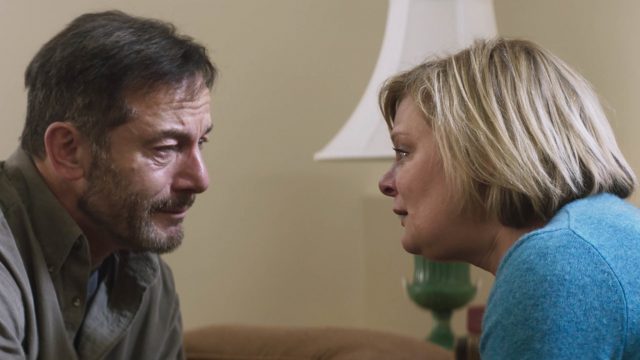Mass: Benign, by David Bax

Mass is the directorial debut of actor Fran Kranz (who also wrote the script). There are a couple of major pitfalls to which actors turned directors seem to fall prey. They often either forget that movies are supposed to be cinematic (like William Shatner’s Star Trek V: The Final Frontier) or they overcorrect and make something self-consciously flashy (like George Clooney’s Confessions of a Dangerous Mind). Sadly, Kranz does both at various times throughout Mass but not before kicking things off with a quiet, assured and distinctive series of scenes that demonstrate his potential.
Eventually, we discover that Mass is the story of what happens when two sets of parents (played by Martha Plimpton and Jason Isaacs on one side of the table, Ann Dowd and Reed Birney on the other) who both lost their children in the same violent incident meet to discuss the events of that day and their potential responsibilities for it. It takes a delicate balance of ingredients in precise ratios to pull off the tightrope act the mixture of hot button and sensitive subject matter this story requires. It’s interesting to watch the characters struggle to do this, trying to focus more on the psychology of the situation but finding that the pesky politics of it all won’t be set aside so easily. But it’s disappointing to see Kranz fail to keep things from teetering over the cliff’s edge, especially in a section of the film in which the grisly details of the day in question are described by the parents. The horrifying nature of the facts, once laid out, begins to feel exploitative, all the more so for being dressed up in respectful solemnity. Before all of this happens, though, we see the volunteers of the church (Breeda Wool and Kagen Albright), the meeting room of which has been offered to the parents for the occasion, getting ready and doing a walkthrough with one couple’s lawyer (Michelle N. Carter). There’s an apprehension to these moments that feel more human than anything else in the film. There is, as well, an uncomfortable sense of humor, which is also very powerfully human.
During these introductory scenes and for a good portion of the main course to come, Kranz’s camera is on a sturdy tripod. Along with an almost complete lack of score, this creates a stillness that reflects the caution with which everyone involved is approaching the meeting. It’s no surprise that the camera eventually does unmoor itself but the moment is so clanging and arch that it shatters the reality. Even less necessary is a change in aspect ratio that feels obvious and film school-ish.
Kranz’s screenplay employs technique with a defter touch. It’s a good while into the movie before we understand the true nature of what happened between these people’s children because they have no reason to come right out and explain to one another what is already known. This builds mystery and tension while also making the characters sound more like real people.
There’s a way to read the film that is crushingly cynical (those exploitative bits don’t help). At the end of the painful conversation, nothing has really changed. All the participants have is a greater familiarity with the cruel randomness of the world and a suspicion that the only thing that can bring a person peace is deciding to die.
But then we recall that the story is set in a church. I don’t know or care about Kranz’s religion and I certainly think Mass is too open to doubts to qualify as a Christian film. But the idea of the church as a steady and reassuring presence in someone’s life instead of being solely about practice proves Kranz is after something more than a vanity project. Mass may be bungled but its director might well have a great film in him yet.




























